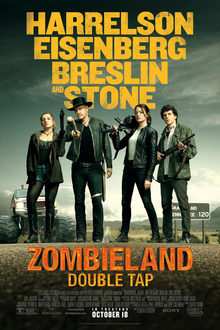
Life in the zombie apocalypse can be quite tough — yet these four know how to make the best of it. The ten-year wait for the sequel to a fan favorite has finally ended, in the too-good-to-be-true reunion of the original cast, who by now have become renowned and award-nominated household names if they weren’t already – Woody Harrelson, Jesse Eisenberg, Emma Stone, and Abigail Breslin. Sony even successfully brought the original writers and director back on board — writers Rhett Reese and Paul Wernick, who have since then found great success with another genre-breaking, beloved series with Deadpool and Deadpool 2 — and director Ruben Fleischer, who even after an awful misstep with whatever the hell Venom was supposed to be, retains the signature taste of what made Zombieland so great. Double Tap is one of those sequels that takes everything the first film does and tries to do it all but bigger, and for the most part the film hits its target quite well. From the opening narration that will already get a few laughs, to a slo-mo opening credits action scene that recalls a montage that opened the predecessor, it’s clear that the heart and unique fun from the first film is back. It’s ideal to watch the first film to thoroughly understand the characters and their relationships, as well as some call-backs, like Harrelson’s character Tallahassee’s signature catchphrases, as well as a joke about a famous celebrity’s unfortunate demise as depicted in the first film. However, Zombieland: Double Tap can still stand on its own for general audiences searching for a violent action comedy that doesn’t hold back.
While not as iconic as he was when he first played the role, Woody Harrelson is still delightful as the badass Tallahassee who since the first film has grown to love his new family but still is the unrestrained, hilarious zombie-killer who loves Elvis and his guns, and takes annoyance towards car designs and pacifism. Eisenberg is also once again solid as Columbus, even though sometimes his narration gets a bit too explanatory or excessive, and his character arc feels slightly questionable at times when it comes to his love interests, and Stone is also charming and great again, though it’s hard today not to compare to her superior performances like La La Land and The Favourite. And while Breslin is still decent, it’s slightly disappointing to see her character separated from the rest of the gang for part of the film so we don’t get to see as much chemistry from the main four. Rosario Dawson and Zoey Deutch are surprisingly terrific additions to the cast who both have plenty of energy and also have great chemistry with the leads. While the film mostly keeps that signature fun the first film had, there’s one action scene that felt poorly shot, with too many cuts and shaky cam. However, this is redeemed by a later long-take action scene that’s quite enjoyable and creative. Also, the humor does sometimes get routine and predictable, but there are still a fair share of laugh-out-loud moments. Overall, the movie doesn’t feel as fresh as the original considering how many films have tried to do similar, and the story doesn’t have the same natural flow, but there’s still plenty to commend here, including an exciting final battle. Ultimately, Zombieland: Double Tap is a worthy sequel, and although some moments are rushed and other comedic moments don’t feel top-tier, the over-the-top violence and dialogue and the ultimate execution of the film including the cast and story, that’s set in a violent apocalyptic world yet still makes you smile and think about themes like family, is what makes it feel worthy of your time and money, so follow Columbus’ list of rules and enjoy the little things by going to enjoy Zombieland: Double Tap on the big screen.



